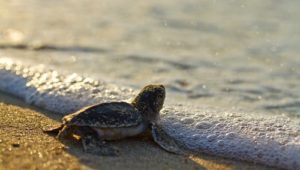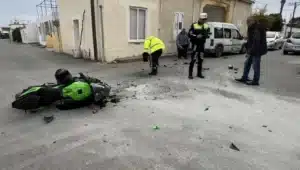 Members and volunteers of the Northern Cyprus Turtle Conservation Society (SPOT), who have been working day and night to protect, sustain and increase sea turtles numbers for the past 29 years in Cyprus, where the most beautiful beaches of the Mediterranean are located, are experiencing the joy and excitement of the first baby turtles of the season leaving their nests, Kibris Postasi reported.
Members and volunteers of the Northern Cyprus Turtle Conservation Society (SPOT), who have been working day and night to protect, sustain and increase sea turtles numbers for the past 29 years in Cyprus, where the most beautiful beaches of the Mediterranean are located, are experiencing the joy and excitement of the first baby turtles of the season leaving their nests, Kibris Postasi reported.
Observing the hatching of the first baby on July 9 in Alagadi, the community team is working hard to ensure that thousands of tiny turtles that will hatch until autumn, survive and safely reach the sea.
North Cyprus is home to the protected Caretta Caretta and Chelonia Mydas (green turtle) turtles. These turtles especially prefer the beaches of Alagadi, Karpaz, Mediterranean, Famagusta and Tatlısu to lay their eggs.
University students from the TRNC and some foreign countries have also been involved in the society’s project for years.
President of the Northern Cyprus Turtle Conservation Society (SPOT) Damla Beton, gave an interview to TAK news agency about the ongoing turtle conservation projects.
 She said that the society was founded by Kutlay Keço and some other turtle lovers in 1992 and that the first sea turtle conservation work in the country was started. Beton said that the society continued its activities in cooperation with this department after the Environmental Protection Department was established.
She said that the society was founded by Kutlay Keço and some other turtle lovers in 1992 and that the first sea turtle conservation work in the country was started. Beton said that the society continued its activities in cooperation with this department after the Environmental Protection Department was established.
Noting that the society’s current activities include not only turtles but also many sea creatures, which continues its conservation efforts with the help of more than 100 volunteers every year, Beton gave the following details about their projects:
“Volunteers can take on two different tasks, especially during our work carried out within the scope of the Turtle Conservation Project. Some of them conduct night studies on Alagadi Beach, which is located in the Alagadi Special Environmental Protection Area. The teams participating in these studies go down to the beach with the sunset, every 10 minutes they walk the beach to see if there is any mother coming to lay eggs. If they see the mother coming to lay eggs, they begin to record her behaviour without using light, without being seen by the turtle. This work in Alagadi has been going on for 29 years”.
“During this process, every female that lays eggs in Alagadi is identified by marking methods. So it can be identified when it comes next time. This helps us to obtain information on many subjects such as how often turtles reproduce, where they come from, and what kind of life they lead. At the same time, we place cages over the slots. Tired from the overnight watch, the crew leaves the beach only at sunrise. Unless, of course, there is a mother who decides to spend the morning at the beach…
“Other teams wake up at the first light of the morning. They get ready immediately and hit the road to protect the nests left on the beaches at night before it gets hot.
“They are trying to protect the eggs from stray dogs and foxes by locating nests and placing cages on them by walking many other places besides the wide beaches in the Mediterranean Special Environmental Protection Area or Tatlısu Special Environmental Protection Area. Sometimes they struggle for hours under the scorching heat”.
“When our association started its first activities in 1992, we thought ‘it was a very good year’ when there were 30-40 nests on the coast of Alagadi. Now the number of slots can reach 400s. This is an indicator of the way traveled in 30 years. It is both an indication of how arduous conservation efforts are and living proof that we can save the lives of species by protecting them. It is also a hopeful story of how much can be achieved by people who focus on one goal in unity”.
Environmental Pollution
Damla Beton expressed the society’s concerns about the pollution seen on the beaches as in many regions of the country and said, “Plastic pollution on our beaches is very high. In some areas, this specifically includes not only our own rubbish, but also the waste left over from Middle Eastern countries. We are trying to carry out more beach cleaning in our regions where there is an incredibly dense sea pollution due to some currents. Cleaning is just the last part of this job. The important thing is not to pollute in the first place”, she warned.
Noting that there should be no delay in applying remedies such as recycling, Beton said, “The important thing is not to consume what you do not need, the important thing is to calculate the effects on other living things while consuming. We have to do this not only for nature, but also for our children, who are our future”.
Damla Beton has asked the public to call 1188 Sea Creatures Support Line if they see dead or injured sea creatures on the beaches.


